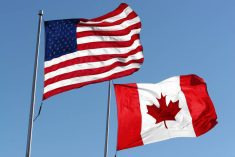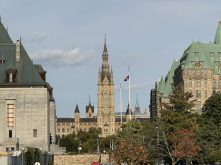Whether it’s called NAFTA, as the president of the United States did this week, or USMCA, the North American trade deal needs to move fast if it is going to avoid going slow.
“No one can, with a straight face, tell us that Canadian steel and aluminum pose a threat to American national security,” said Canada’s Foreign Affairs Minister Chrystia Freeland after a meeting in Washington March 25, as she attempts to get a deal headed to Congress for approval.
“I made the case to ambassador Lighthizer that these tariffs are completely unacceptable to Canada … to impose these tariffs on steel and aluminum on national security grounds is illegal, unjustified and frankly completely absurd,” she said.
Read Also

Farming Smarter receives financial boost from Alberta government for potato research
Farming Smarter near Lethbridge got a boost to its research equipment, thanks to the Alberta government’s increase in funding for research associations.
Freeland was fresh from a meeting with U.S. Trade Representative Robert Lighthizer, where the two spent most of their time discussing that issue in the face of attempting to ratify last year’s three-nation trade deal.
“These tariffs cause many questions about ratifying NAFTA under these conditions…. Many Canadians feel this NAFTA is a free trade deal with the United States. All countries made some compromises to make this deal and in order to move ahead with that deal, the right thing is there should be no 232-tariffs or retaliatory measures between our three countries,” said Freeland.
The U.S. imposed its Section 232 tariffs for steel and aluminum a year ago to create advantages for its domestic producers on the grounds of protecting national security, while leveraging negotiations around the renewal of NAFTA. A program to lift tariffs on the two metals from Canada and Mexico was linked to the renegotiation of the NAFTA but did not make it through that process. Both Canada and Mexico have told U.S. lawmakers that it must be removed for the new NAFTA to be completed.
Freeland said she knows Canada’s retaliatory measures on $16 billion of targeted trade are hurting American businesses. These include import surtaxes on many steel and aluminum products, as well as agriculture and food products, such as processed meats, and many paper items.
Canadian farm equipment manufacturers say they are having to increase equipment and building prices as a result of the effects of the 232 tariffs (see our story in the March 21 edition of the Western Producer), which have driven up prices for the American metal they have to buy.
Several U.S. lawmakers have said they did not believe the new U.S.-Mexico-Canada Agreement, or USMCA, or CUSMA as it is known in Canadian legislation, could be ratified by the U.S. Congress if the metals tariffs along with retaliatory duties on American farm and other products were left in place.
The U.S administration has sought quotas on steel and aluminum in lieu of tariffs, but Canada and Mexico have resisted these, arguing that their metals pose no threat to U.S. national security.
USMCA-enabling legislation needs to be placed in front of Congress so it could be considered before the House recesses in August if it is going to avoid being caught up in another border wall funding fight in the fall or the subsequent 2020 presidential election campaign.
Contact mike.raine@producer.com

















